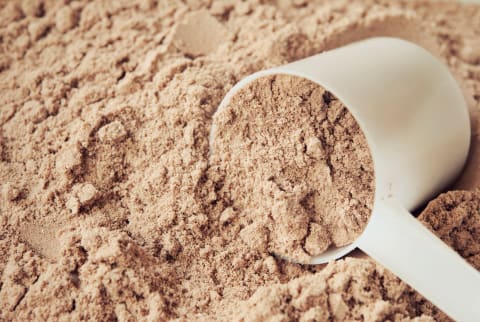
Registered Dietitian Nutritionist
By Molly Knudsen, M.S., R.D.N.
Registered Dietitian Nutritionist
Molly Knudsen, M.S., RDN is a Registered Dietician Nutritionist with a bachelor’s degree in nutrition from Texas Christian University and a master’s in nutrition interventions, communication, and behavior change from Tufts University. She lives in Newport Beach, California, and enjoys connecting people to the food they eat and how it influences health and wellbeing.

Image by magnez2 / iStock
July 22, 2023
Most likely, you either come from an appetizer family (and enjoy a pre-meal nosh and beverage) or you don’t (and save space for the meal). Well, a newly published review of 16 clinical studies may have you rethinking your pre-meal choices to something a bit unexpected: whey protein. The data consistently show that having whey protein before a meal helps lower blood glucose (aka sugar) after you eat.
Advertisement
This ad is displayed using third party content and we do not control its accessibility features.
These were the study’s key findings
All the studies included in this analysis compared the impact of a whey protein supplement (basically a protein shake) before a meal to drinking water. Studies did differ quite a bit in how long before a meal people consumed the protein and how much protein people ate. But the results were pretty consistent. Here are the three key findings.
1. Whey protein significantly lowered peak blood sugar after a meal
Anytime a meal (or snack) containing carbohydrates is consumed, blood sugar rises. It’s biology. But oftentimes if a carbohydrate-containing meal isn’t balanced with the other macronutrients (protein and fat), blood sugar levels spike quickly and then drop.
This review showed that having whey protein before a meal significantly lowered this peak glucose concentration afterward. And those with type 2 diabetes also experienced a greater reduction of blood glucose levels 30 minutes to 2 hours after the meal—compared to those without diabetes.
Advertisement
This ad is displayed using third party content and we do not control its accessibility features.
2. Whey protein increased GLP-1 and insulin
GLP-1 (or glucagon-like peptide-1) is a hormone produced by the gut lining when food is consumed. It’s known as an appetite regulator, and its main function is to trigger the secretion of insulin—the hormone responsible for lowering blood sugar levels.
And whey protein was linked to both of these favorable hormonal increases (insulin with a bit more certainty).
3. Whey protein slowed gastric emptying rate
Whey protein may slow down how long it takes food to move from the stomach to the intestines (aka the gastric emptying rate). While you don’t want this movement to be too fast or too sluggish, a somewhat slower gastric emptying rate promotes feelings of fullness and satisfaction after a meal.
Protein is considered to be the most satiating macronutrient, and research shows whey seems to be especially effective at this compared to casein1 or soy protein2 supplements.
Won’t you gain weight?
One potential concern is the possibility of weight gain from increased calorie intake from the supplement. But research shows that whey protein actually has weight-stabilizing effects.
Advertisement
This ad is displayed using third party content and we do not control its accessibility features.
How much whey protein do you need for these benefits?
Researchers weren’t able to pinpoint the best amount of whey to take in before a meal. Some of the studies included in this review looked at a low protein dose of four grams, whereas others looked at a much higher dose of 55 grams. Most whey protein supplements provide about 20-25 grams of protein per serving.
RELATED READ: Protein Needs For Women: How Much Is Enough — And What’s Too Much?
What’s the best timing?
You can drink your whey protein shake anywhere from 30 minutes before to at the time of the meal for blood sugar benefits. The researchers didn’t notice significant differences in blood sugar control when the protein was consumed in that timeframe.
RELATED READ: When To Consume Protein Powder: Research-Backed Timing Tips
Advertisement
This ad is displayed using third party content and we do not control its accessibility features.
The takeaway
Whether you sip on it while cooking or enjoy it along with a meal, a whey protein supplement can help balance your post-meal blood sugar levels according to research.
Advertisement
This ad is displayed using third party content and we do not control its accessibility features.
